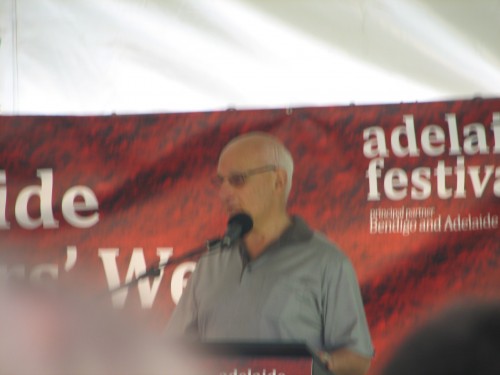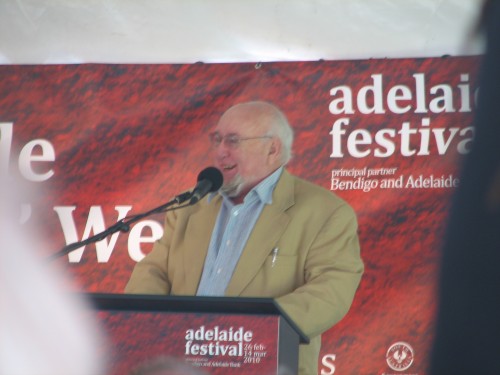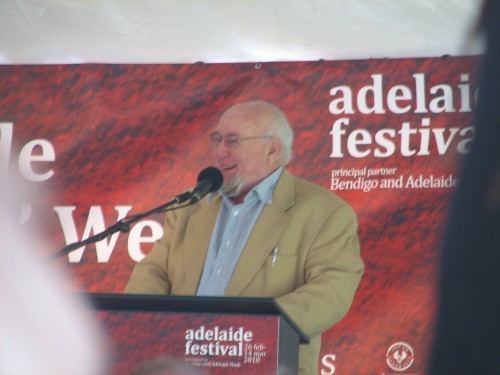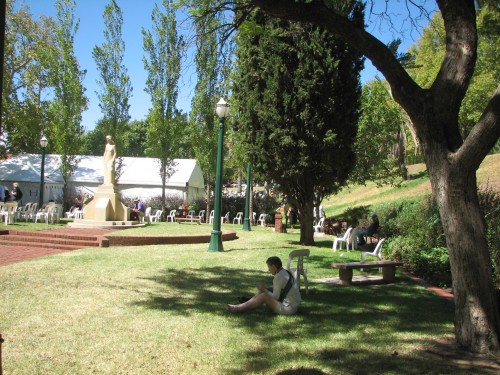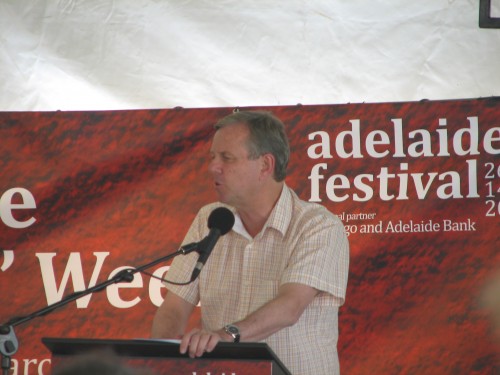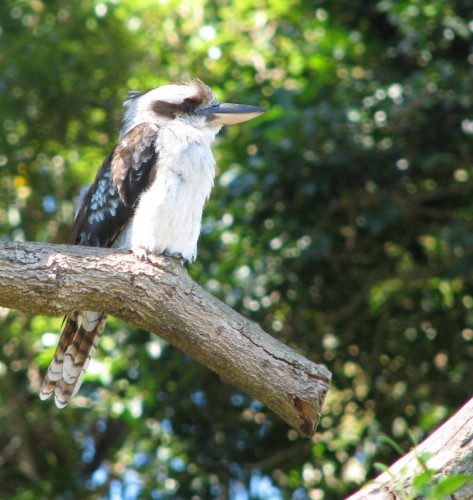Children’s Book of the Year winners 2010
The Children’s Book Council of Australia has announced the winners of this year’s Book of the Year awards.
For the full list of both the winning books and the honour books click here.
Permit me a few moments of dreaming: I hope one day my name will be listed in these awards.
Okay – dream over – back to editing my novel so that someday I can be in the running.
Good writing.
A talented panel of writers
Adelaide Writers’ Week 2010
On the first morning of this year’s Adelaide Writers’ Week I was suddenly struck by the importance of the opening session. The panel on stage was a who’s who of Australian literature. Chair of the session was novelist David Malouf. The keynote speaker was novelist and historian Tom Keneally. The chairman of the Writers’ Week Advisory committee was South African born but now Adelaide resident, novelist and Nobel Prize for Literature winner John Coetzee. And finally there was renowned poet Tom Shapcott, who received the honour of the whole week being dedicated to him. His latest book of poetry was launched soon after the opening.
What a line up of talented, prominent writers!
It was inspiring to be in the company of such eminent men of letters.
Adelaide Writers’ Week March 2010
Last week I attended three days of the six day Adelaide Writers’ Week. This is an important and integral part of the Adelaide Festival of Arts held every two years. This festival attracts readers and writers from all over Australia, as well as a glittering gathering of international writers who come as guest speakers. Each day starts at 9:30am and runs until 6pm so it is quite a marathon effort for organisers and attendees as well. The sessions are all free (except for several evening sessions in the Town Hall). The sessions vary from panel discussions on writing, reading and literature through to book launches and meet-the-author opportunities.
Three large marquees are set up in the Pioneer Women’s Memorial Gardens a five minute walk from the CBD. The East Tent and the West Tent host sessions concurrently while the Book Tent is housed in another tent in between. This shop features books written only by authors present on the programme. All authors are available for book signings too.
On the first day of the festival there was a special session to announce the winners of the Festival Awards for Literature. This was done by the Premier of South Australia, Mike Rann. In all there are ten awards ranging from plays, children’s books, non-fiction to unpublished manuscripts. The cash awards are very generous and I applaud the state government for supporting our writers in this way. May it continue.
Further reading:
Review “The Slap” by Christos Tsiolkas

The slap
I bought this novel The Slap by acclaimed Australian author Christos Tsiolkas late last year as a birthday present to myself. I had heard so much comment about the novel that I wanted to read it. It was also short listed for the 2009 Miles Franklin Literary Award and was winner of the 2009 Commonwealth Writers’ Prize, two more reasons for wanting to read it. There had been considerable media hype since its publication.
I resisted reading it for some weeks, keeping it on hold until our beach holiday just before Christmas. In the few days before starting to read it, I read Tim Winton’s The Turning. I reviewed that book yesterday. I thoroughly enjoyed Winton’s collection of stories set in Western Australia and picked up The Slap with enthusiasm. I was enjoying a prolonged holiday of reading, and, at almost 500 pages, this was a work I could really lose myself in over the holiday break.
Wrong.
From the first page I was not only disappointed, I was furious, revolted, disgusted and appalled – sometimes all at the same time.
Strengths
The premise is brilliant: a group of people living in Melbourne gather for a backyard barbecue. All is going well until one of the younger children behaves abominably and one of the adults slaps him. Trouble is – the adult is not his father. The novel is in eight parts, each told from a different person’s point of view of the same incident. Each section covers the life of the person relating the incident, the events before and after “the slap” and their reactions to the event. It affects each in various ways, and for many different reasons.
In my opinion, the only other strength of this book is the characterisation. Tsiolkas has drawn eight major characters (as well as a few minor characters) brilliantly. By the end of each section you feel that you really know the person thoroughly. In fact, you could meet any one of them at a barbecue or at the pub this weekend.
Weaknesses
From the very first page Tsiolkas sets out to shock the reader. There is frequent very coarse language, something I find very objectionable. It is also unnecessary. If it is in character, and used for the purpose of shocking the reader, then it may have a place, used occasionally. After the first two or three pages of this novel, it no longer shocks; IT IS VERY IRRITATING. And very poor writing. Couldn’t the writer think of another word?
I find the same thing in many movies and television shows these days. Otherwise brilliant films like Four Weddings and a Funeral are very much the poorer for all the coarse language. Writers: if you want to shock the viewer do it very sparingly, otherwise it no longer shocks. It is just lazy writing!
Two major themes of the novel relate to drugs and sex. It would seem to anyone from another city or country, on reading this novel, would conclude that everyone living in Melbourne is either regularly out of their brains on drugs, or out of their pants in yet another bizarre sexual activity – or both! Sure, this probably reflects the lifestyle of about 0.1% of Melbourne’s population, most of them crammed into the characters in this novel. It occurred to me that whenever the plot was wandering, or getting weak, Tsiolkas would decide to throw in more about drugs or sex. In sections it borders on the pornographic. Again, lazy writing in my opinion. This book reads like a set of interesting, well written characters in search of a good plot!
Conclusions
This novel has been praised for the quality of the writing. It has won awards and prizes. It has sold many copies and done very well for the author.
I have read many reviews of this novel, many of them praising the book and placing it on a very high pedestal indeed, saying, in effect, there should be more high quality writing like this in Australian literature.
What rubbish!
Such reviewers wouldn’t know good literature if it bit them on the nose. If this is indicative of the fine level of Australian literature, it is a major concern. Thank goodness we have the likes of Tim Winton who writes brilliantly. I look forward to reading more of his works. I’m sure I’ll never read anything else by Tsiolkas.
Offer: Anyone want to buy a ‘read-only-once-and-never-again’ book?
Going cheap.
Australia Day 2010 honours our writers
January 26th is Australia Day, a special day celebrating the first landing of European settlers in Sydney Cove, 1788.
The day is celebrated in many ways: family gatherings, picnics, barbecues, going to the beach, attending sporting events or just having a lazy day in the middle of the Australian summer.
Every year for the last few years Australia Post has celebrated the event by issuing a special set of postage stamps called Australian Legends. This series of stamps features people who have made a major contribution to Australian life and culture.
This year the stamps are called Australian Legends of the written word. They highlight the works of six of our most prominent writers. The writers honoured in this way are Peter Carey, David Malouf, Colleen McCullough, Bryce Courtenay, Thomas Keneally and Tim Winton.
I think it is wonderful that our leading novelists have been honoured in this way. Writers in Australia are often overlooked for the massive contribution they have made to our culture. Each of the writers featured are truly deserving of the honour.
Where are they?
Of course, by featuring these six writers, many other well deserved writers have been overlooked. In the field of novelists another 15 to 20 worthy recipients could have been listed, including Nobel Prize winner J.M. Coetzee. Admittedly, he was born in South Africa but now resides here in my home state of South Australia. Bryce Courtenay was also born in South Africa, so here is an inconsistency in the choice of recipients. And what of Patrick White, Helen Garner, Kate Grenville, Peter Goldsworthy, Robert Dessaix and Elizabeth Jolley? The list could go on and on. Then you have the great writers who are no longer contemporary, such as Henry Lawson and Banjo Paterson.
My major gripe however is that no poets or children’s authors are represented. Judith Wright, Les Murray, Bruce Dawe and Gwen Harwood have all had significant influences in the field of poetry. That’s just four I could name from dozens of worthy recipents.
Australian children’s authors lead the world in their field. Writers like Colin Thiele, Mem Fox, Sonya Harnett, Ivan Southall and dozens more have had or continue to have a significant impact on young readers around the world.
I guess that Australia Post had a difficult job narrowing the choice down to just six writers, but a little balance in the final six would have been nice.
Links:
- Australian Legends of the written word
- Peter Carey
- David Malouf
- Colleen McCullough
- Bryce Courtenay
- Thomas Keneally
- Tim Winton
